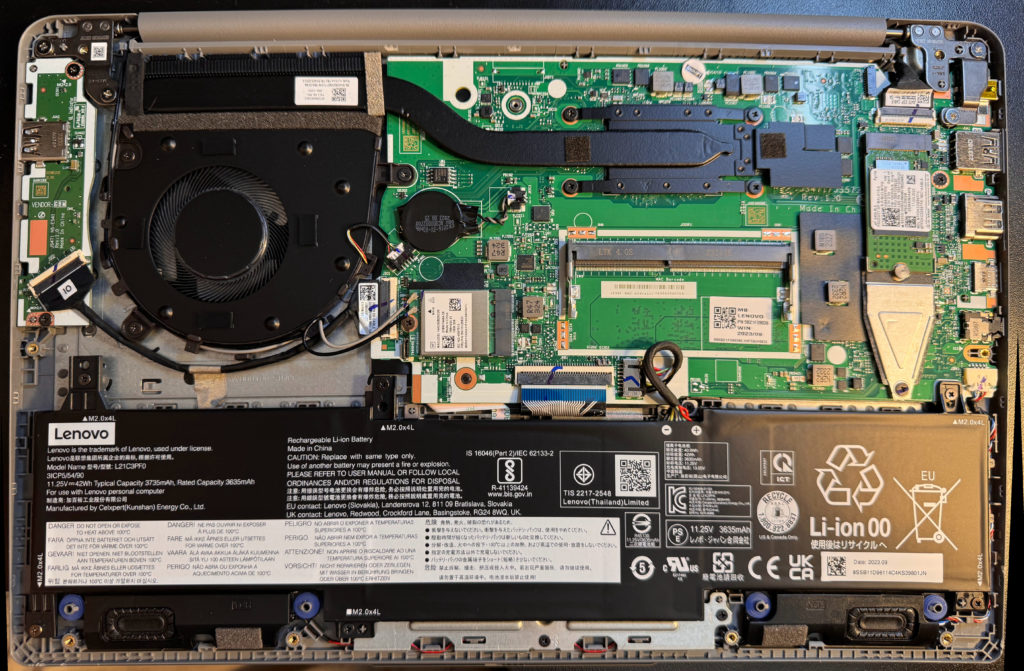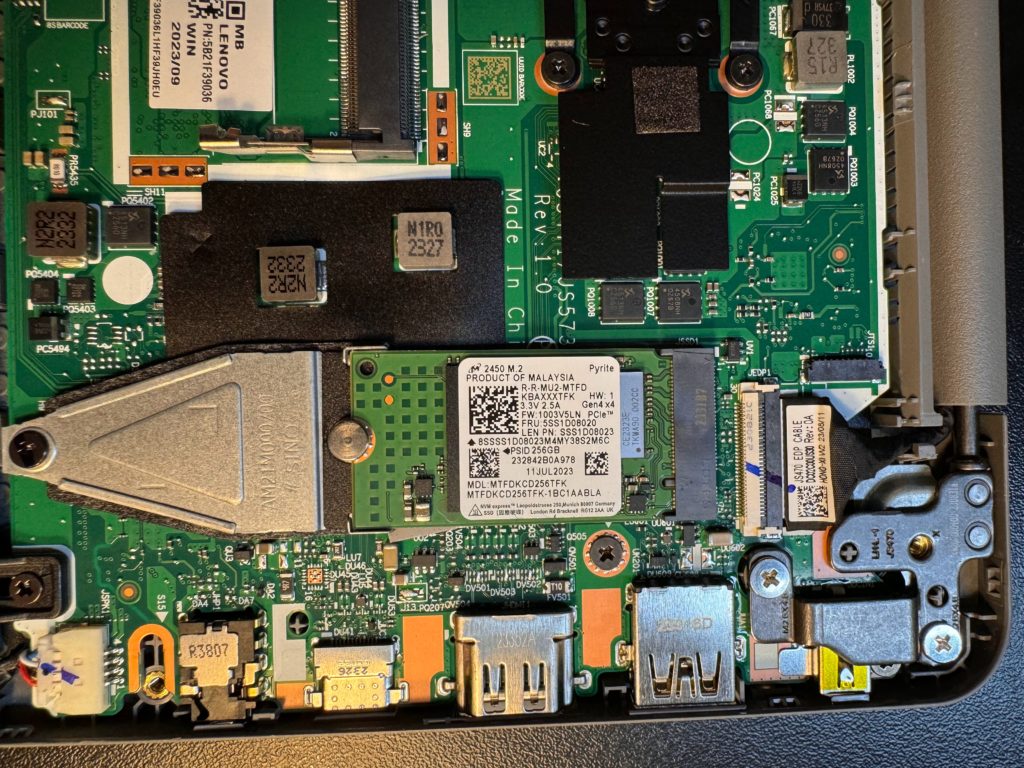Lenovo IdeaPad 1 14″ Laptop Computer – Cloud Grey (AMD Ryzen 5 5500U 2.1GHz Processor; 8GB DDR4-3200 Onboard RAM; 256GB Solid State Drive; AMD Radeon 7 Graphics) USD$ 229.99 + taxes.
Micro Center product page screenshot.


Went to the BIOS and changed it to performance mode. Got the Windows keys out and installed Ubuntu 22.04.3 LTS (jammy).
PCI buses information:
$ sudo update-pciids
$ lspci -nn
00:00.0 Host bridge [0600]: Advanced Micro Devices, Inc. [AMD] Renoir/Cezanne Root Complex [1022:1630]
00:00.2 IOMMU [0806]: Advanced Micro Devices, Inc. [AMD] Renoir/Cezanne IOMMU [1022:1631]
00:01.0 Host bridge [0600]: Advanced Micro Devices, Inc. [AMD] Renoir PCIe Dummy Host Bridge [1022:1632]
00:02.0 Host bridge [0600]: Advanced Micro Devices, Inc. [AMD] Renoir PCIe Dummy Host Bridge [1022:1632]
00:02.1 PCI bridge [0604]: Advanced Micro Devices, Inc. [AMD] Renoir/Cezanne PCIe GPP Bridge [1022:1634]
00:02.2 PCI bridge [0604]: Advanced Micro Devices, Inc. [AMD] Renoir/Cezanne PCIe GPP Bridge [1022:1634]
00:02.4 PCI bridge [0604]: Advanced Micro Devices, Inc. [AMD] Renoir/Cezanne PCIe GPP Bridge [1022:1634]
00:08.0 Host bridge [0600]: Advanced Micro Devices, Inc. [AMD] Renoir PCIe Dummy Host Bridge [1022:1632]
00:08.1 PCI bridge [0604]: Advanced Micro Devices, Inc. [AMD] Renoir Internal PCIe GPP Bridge to Bus [1022:1635]
00:08.2 PCI bridge [0604]: Advanced Micro Devices, Inc. [AMD] Renoir Internal PCIe GPP Bridge to Bus [1022:1635]
00:14.0 SMBus [0c05]: Advanced Micro Devices, Inc. [AMD] FCH SMBus Controller [1022:790b] (rev 51)
00:14.3 ISA bridge [0601]: Advanced Micro Devices, Inc. [AMD] FCH LPC Bridge [1022:790e] (rev 51)
00:18.0 Host bridge [0600]: Advanced Micro Devices, Inc. [AMD] Renoir Device 24: Function 0 [1022:1448]
00:18.1 Host bridge [0600]: Advanced Micro Devices, Inc. [AMD] Renoir Device 24: Function 1 [1022:1449]
00:18.2 Host bridge [0600]: Advanced Micro Devices, Inc. [AMD] Renoir Device 24: Function 2 [1022:144a]
00:18.3 Host bridge [0600]: Advanced Micro Devices, Inc. [AMD] Renoir Device 24: Function 3 [1022:144b]
00:18.4 Host bridge [0600]: Advanced Micro Devices, Inc. [AMD] Renoir Device 24: Function 4 [1022:144c]
00:18.5 Host bridge [0600]: Advanced Micro Devices, Inc. [AMD] Renoir Device 24: Function 5 [1022:144d]
00:18.6 Host bridge [0600]: Advanced Micro Devices, Inc. [AMD] Renoir Device 24: Function 6 [1022:144e]
00:18.7 Host bridge [0600]: Advanced Micro Devices, Inc. [AMD] Renoir Device 24: Function 7 [1022:144f]
01:00.0 SD Host controller [0805]: O2 Micro, Inc. SD/MMC Card Reader Controller [1217:8621] (rev 01)
02:00.0 Network controller [0280]: MEDIATEK Corp. MT7921 802.11ax PCI Express Wireless Network Adapter [14c3:7961]
03:00.0 Non-Volatile memory controller [0108]: Micron Technology Inc 2450 NVMe SSD [HendrixV] (DRAM-less) [1344:5411] (rev 01)
04:00.0 VGA compatible controller [0300]: Advanced Micro Devices, Inc. [AMD/ATI] Lucienne [1002:164c] (rev c2)
04:00.1 Audio device [0403]: Advanced Micro Devices, Inc. [AMD/ATI] Renoir Radeon High Definition Audio Controller [1002:1637]
04:00.2 Encryption controller [1080]: Advanced Micro Devices, Inc. [AMD] Family 17h (Models 10h-1fh) Platform Security Processor [1022:15df]
04:00.3 USB controller [0c03]: Advanced Micro Devices, Inc. [AMD] Renoir/Cezanne USB 3.1 [1022:1639]
04:00.4 USB controller [0c03]: Advanced Micro Devices, Inc. [AMD] Renoir/Cezanne USB 3.1 [1022:1639]
04:00.5 Multimedia controller [0480]: Advanced Micro Devices, Inc. [AMD] ACP/ACP3X/ACP6x Audio Coprocessor [1022:15e2] (rev 01)
04:00.6 Audio device [0403]: Advanced Micro Devices, Inc. [AMD] Family 17h/19h HD Audio Controller [1022:15e3]
05:00.0 SATA controller [0106]: Advanced Micro Devices, Inc. [AMD] FCH SATA Controller [AHCI mode] [1022:7901] (rev 81)
05:00.1 SATA controller [0106]: Advanced Micro Devices, Inc. [AMD] FCH SATA Controller [AHCI mode] [1022:7901] (rev 81)Installing AMD drivers:
$ sudo apt install gdebi
$ sudo gdebi amdgpu-install_5.7.50702-1_all.deb
$ amdgpu-installDrivers information:
$ glxinfo -B
name of display: :0
display: :0 screen: 0
direct rendering: Yes
Extended renderer info (GLX_MESA_query_renderer):
Vendor: AMD (0x1002)
Device: AMD Radeon Graphics (renoir, LLVM 16.0.6, DRM 3.49, 6.2.0-36-generic) (0x164c)
Version: 23.2.0
Accelerated: yes
Video memory: 2048MB
Unified memory: no
Preferred profile: core (0x1)
Max core profile version: 4.6
Max compat profile version: 4.6
Max GLES1 profile version: 1.1
Max GLES[23] profile version: 3.2
Memory info (GL_ATI_meminfo):
VBO free memory - total: 1138 MB, largest block: 1138 MB
VBO free aux. memory - total: 2991 MB, largest block: 2991 MB
Texture free memory - total: 1138 MB, largest block: 1138 MB
Texture free aux. memory - total: 2991 MB, largest block: 2991 MB
Renderbuffer free memory - total: 1138 MB, largest block: 1138 MB
Renderbuffer free aux. memory - total: 2991 MB, largest block: 2991 MB
Memory info (GL_NVX_gpu_memory_info):
Dedicated video memory: 2048 MB
Total available memory: 5120 MB
Currently available dedicated video memory: 1138 MB
OpenGL vendor string: AMD
OpenGL renderer string: AMD Radeon Graphics (renoir, LLVM 16.0.6, DRM 3.49, 6.2.0-36-generic)
OpenGL core profile version string: 4.6 (Core Profile) Mesa 23.2.0-devel
OpenGL core profile shading language version string: 4.60
OpenGL core profile context flags: (none)
OpenGL core profile profile mask: core profile
OpenGL version string: 4.6 (Compatibility Profile) Mesa 23.2.0-devel
OpenGL shading language version string: 4.60
OpenGL context flags: (none)
OpenGL profile mask: compatibility profile
OpenGL ES profile version string: OpenGL ES 3.2 Mesa 23.2.0-devel
OpenGL ES profile shading language version string: OpenGL ES GLSL ES 3.20
Testing if APU is working:
$ sudo apt-get install mesa-utils
$ vblank_mode=0 glxgears
ATTENTION: default value of option vblank_mode overridden by environment.
54476 frames in 5.0 seconds = 10895.144 FPS
54569 frames in 5.0 seconds = 10913.684 FPS
55201 frames in 5.0 seconds = 11038.656 FPSBenchmarking with glmark2:
$ sudo apt-get install glmark2
$ glmark2 --show-all-options
=======================================================
glmark2 2021.02
=======================================================
OpenGL Information
GL_VENDOR: AMD
GL_RENDERER: AMD Radeon Graphics (renoir, LLVM 16.0.6, DRM 3.49, 6.2.0-36-generic)
GL_VERSION: 4.6 (Compatibility Profile) Mesa 23.2.0-devel
=======================================================
...
glmark2 Score: 2429
















